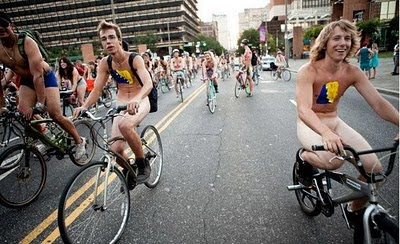
A GOOD MAGAZINE represents the editor,
Vice magazine editor
Jesse Pearson said in class yesterday.
"The mag needs to be about my curiosity," said the
Levittown native who has lead the magazine since 2003.
This year, Vice did a
photo spread involving bears (
burly gay dudes) dressed as vikings. Pearson assigned a gay pornographer to do a Q&A with
Karl Lagerfeld. That same issue features a fashion spread with models in caskets, looking like they're dead.
"It's just something I always wanted to do," Pearson said. "Models lead these really unhealthy lifestyles."
Actually, he said he always wanted to dress up actual dead people and photograph them. He probably could have done that. He has no editorial oversight whatsoever, he said.
Here are a few other things he said that stood out for me:

• The monthly magazine is free, so it is advertiser funded. But the advertisers have no influence on the content of the mag (Dickies did pull their ads after a male unit was displayed in all it's glory in the mag).
• A
revealed testicle in a photo in the bear shoot had to be discussed with the publisher. It ran in the mag.
• There is occasional "
branded content" but that is not usually handled by the small editorial team. "It makes me uncomfortable," Pearson said.
• He doesn't consider other mags to be competition because Vice is free.
• Since the mag is distributed for free, he really doesn't know who is the audience. "Doing this mag is like shooting into a vacuum," he said.
• His 88-year old grandmother reads Vice on her iPad.
• Every issue of the magazine has a theme, like catastrophe, Iraq, fashion, Appalachia, sellouts, etc.
• There are only four staffers on the US edition. But they have loads of freelance contributors, and there are more than 25 offices/ editions (each with their own staff) around the world.
• The contributors tend to have a connection to Pearson, and
most have
a similar ideology.
• He respects
Jackass. "I think it's brilliant, like Vaudeville," he said.
• If Vice was a television talk show, it would be like
Dick Cavett.
• He has no sell lines on the cover of the mag because he doesn't have to worry about newsstand sales. "I don't know who would do sell lines if they didn't have to," he said.
• Vice is not a hipster mag, nor do they claim set the standards for what is deemed "cool." Pearson said, "We strive to be as inclusive as possible."
• He is planning to step down from Vice after the next issue. He wants to work on projects beyond the one-month-at-a-time pace, maybe books and freelance stuff.
• "I love this city more than New York," he said of Philadelphia.
What stood out for you?








































